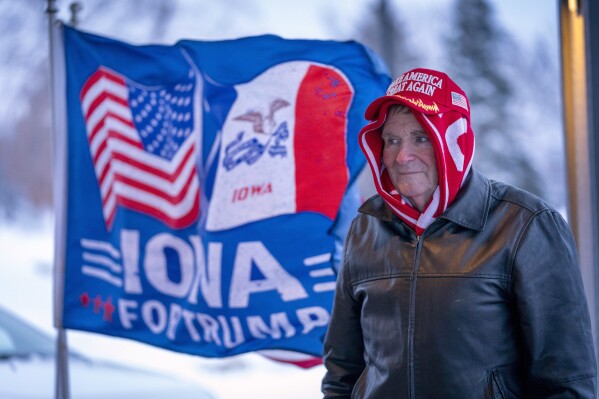[ad_1]
DES MOINES, Iowa (AP) — Most Iowans won’t opt out Monday night, don’t care that it’s Expected to be well below zeroWith wind chill temperatures as low as minus 40 degrees, and the snow storms that hit the state last week, roads may still be icy.
This is because they are not registered with the Republican Party, which is Presidential nomination season begins with famous caucus, Or because they don’t want to make the commitment to participate, which involves driving to the nearest of 1,500 caucus sites and sitting in a room — possibly for hours — for the opportunity to vote on the party’s presidential nominee.
But winter weather, threatening even for Iowa, will make an already unrepresentative process even less representative. Elderly Iowans, the backbone of the caucus, are wondering how they will get to their site on Monday. Political types are mentally crunching their expected turnout and wondering who the small, tight-knit electorate will favor.
All this gives longtime critics of the caucus even more reason to be critical.
“This is no way to start a presidential election,” said former San Antonio mayor and federal Housing Secretary Julián Castro, who was the Democratic presidential nominee in 2020, when he called for giving Iowa a less prominent role . “You have to be a tough guy who is willing to go through the snow and be out there for many hours. And if you miss, your opportunity to vote is gone.”
democrats already have downgrade Iowa after the state party messed up the vote count in the 2020 caucuses. Democrats later swept the state in their nominating process. President Joe Biden Announced that he wants more diverse early voting states that better represent his party and the country. That party starts in South Carolina But February 3Then goes to Nevada and then New Hampshire.
But Republicans are holding on to Iowa, which was once competitive but has moved firmly to the right Donald Trump’s ageWho led the state in the general elections in 2016 and 2020. Its population is whiter, more rural and evangelical than the nation’s, but it matches GOP voters better than the Democratic Party.
Some Republicans still expect strong turnout, but most acknowledge the weather will scare off at least some voters.
“It’s going to be worse than we’ve had before,” said Doug Gross, a onetime top aide to former Republican Gov. Terry Branstad. He said his own 90-year-old mother had decided she could not caucus under the circumstances. , “This will reduce the voting percentage.”
Brad Anderson, state director of AARP Iowa, said older voters historically decide who wins and loses contests because “the caucuses tend to be older in terms of voting.”
This caucus may be “somewhat outlier,” he said.
Anderson said the cold and possible snowfall, especially in rural parts of the state, make conditions “treacherous” for people of all ages. He advised extreme caution, especially for people with mobility issues, and hopes Iowans will keep safety in mind.
An elderly woman who lives in a retirement home in Newton called Jasper County Republican Chairman Thad Nearmyer to say she still drives, but “she would be a little more comfortable if someone else were driving,” he said. . She will ask friends, family and neighbors to come to Monday’s caucus.
Organizing a riding widely would be a huge undertaking for the county party, but Nearmyer recommended that people who want to participate in the caucus reach out to friends, family and neighbors.
“You know, if it had been windy and snowing like this right now, no one would have been able to make it,” Nearmyer said Friday. “But I think we’ve got time for the roads to clear, for the wind to die down. “I think a lot of people will be involved.”
Even under better circumstances, only a small portion of Iowans participate in the caucuses. In 2016, 186,000 votes were cast in the Republican caucus in a state population of more than 3.1 million. And it provides the most important opening to the contest to lead a country of 330 million people.
FILE – A woman shovels snow from a sidewalk in Des Moines, Iowa, Tuesday, Jan. 9, 2024. The arctic-like temperatures, which are raising concerns about the Iowa caucuses voting on Monday, Jan. 15, are focusing attention on a presidential nominating system that has long been criticized as antiquated and undemocratic. (AP Photo/Abby Parr, File)
is a relic of the caucus Emphasis on improving party nomination processes In the 1970s, he was freed from the influence of party bosses. He helped put Democrats such as Jimmy Carter and Barack Obama into the White House.
Caucuses tend to favor movement candidates – liberal Democrats and conservative, increasingly evangelical Republicans – whose supporters are more willing to carve out time on their calendars and dominate the caucus room.
The small size of the program, and Iowa overall, is part of the pitch, said Stanford law professor Rabia Belt, who has been critical of the caucus.
“There are conflicting desires in designing the nomination process,” Belt said. “If you start in larger states, or states with expensive media markets, it creates barriers for potential candidates who may not have a lot of money or organizational power at the beginning. Furthermore, a smaller state may allow candidates to deliver their messages and work on their retail political game while having intimate conversations with committed and interested people.
University of Denver political scientist Seth Masket was preparing to take 13 of his students to watch the caucuses on Friday. He was prepared for the weather as well as the randomness of the American nomination process.
“Nobody would design this on purpose,” Masket said. “No one would design something where the most important contests are in Iowa and New Hampshire – in January!”
[ad_2]
Source link
